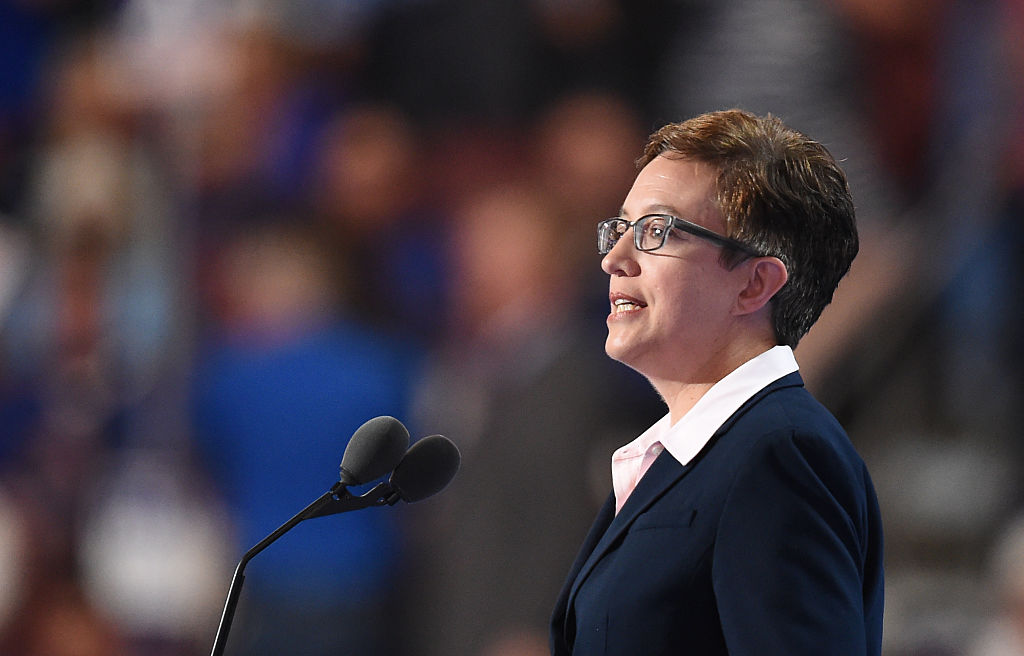Tina Kotek could be well on her way to being the thirty-ninth governor of Oregon. The Democrat, who previously served as speaker of the state’s House of Representatives, won her party’s primary this Tuesday. And with a Democratic supermajority in the legislature and a governor’s mansion that hasn’t housed a Republican since 1979, that’s likely a one-way ticket to victory in November.
Kotek is, in many ways, a creature of the state Democratic establishment. Yet in Oregon — and in blue states like it — “establishment Democrat” means something very different than it once did. As a de facto one-party state, Oregon politics are effectively run by powerful progressive interests — teacher and labor unions, environmentalist organizations, progressive activist groups, and so on. As those groups have lurched left in recent years, the center of gravity in the Democratic Party has too.
This leftward movement came to a head in recent years with the toxic combination of exceptionally draconian rolling Covid lockdowns and a studied unwillingness to prosecute crime in cities like Portland. Together, the two amounted to what the paleoconservative writer Sam Francis described as “anarcho-tyranny” — “the combination of oppressive government power against the innocent and the law-abiding and, simultaneously, a grotesque paralysis of the ability or the will to use that power to carry out basic public duties such as protection or public safety.”
So in an important sense, Kotek — who now faces a three-way general election battle against Republican Christine Drazan and Democrat-turned-independent Betsy Johnson — is running on more of the same. “She’s the establishment candidate for sure,” says Jeff Eager, the former Republican mayor of the mid-sized Oregon city of Bend and the author of a weekly newsletter on Oregon politics. “The unions are gambling that they can push even farther left and get away with it.” He adds, “Kotek entirely stands for business as usual in Oregon.”
What “business as usual” means, of course, is pushing an already-precarious state ever closer to the brink of civic breakdown. And even by Oregonian standards, Kotek is decidedly on the leftward edge of the Democratic establishment. The Williamette Weekly writes:
During the course of Kotek’s tenure, Democrats consolidated power and moved aggressively on such measures as granting driver’s licenses and publicly funded abortions to undocumented immigrants…one of the nation’s most aggressive green energy mandates, [and] statewide rent control.
Additionally, amid a burgeoning homelessness crisis — now the fourth-worst in the country — “Kotek was chief sponsor of House Bill 3115, which enshrined in state law the right to camp in public spaces—over pushback in Salem from critics who saw the bill as exporting Portland’s policies to the rest of the state.” And, “in 2018, Kotek abruptly removed a longtime moderate as chair of the House Judiciary Committee — Representative Jeff Barker of Aloha — to achieve a top progressive priority: criminal justice reform, including the abolition of Oregon’s death penalty.”
In July 2020, when Black Lives Matter protesters tried to burn down a police union building in Portland — while people were still inside — Kotek penned a letter admonishing the police, as well as Portland mayor Ted Wheeler, for responding with tear gas. Calling law enforcement’s crowd-control efforts “completely unacceptable,” Kotek wrote, “What needed to be protected last night? An empty office building? Was this need more important than the health of neighbors, of children in a neighborhood, of people returning home from work?”
(That letter prompted an angry response from Daryl Turner, the president of Portland Police Association: “How do you know the office was empty? Were you aware that two PPA officials, including myself, were in the office that evening?”)
In other words, don’t expect a course-change in Oregon’s burgeoning crime or homelessness problem anytime soon. Don’t expect any positive reforms to the state’s failing public school system either. Oregon might boast the eighth-worst education system in the country and the fourth-worst graduation rate and teacher-to-student ratio. But Kotek is endorsed by the state’s biggest teacher union — and the biggest villain in the Oregon education crisis — the Oregon Education Association. Unsurprisingly, her education platform neglects to mention school choice or any reforms that would challenge the union stranglehold, opting instead to dump more tax money into a broken system.
By all accounts, Kotek is also — to quote a former president — a nasty woman. Throughout her time in office, she’s been ruthless to anyone who crosses her. When state representative Marty Wilde, a Democrat from Eugene, made the mistake of raising concerns about the integrity of Kotek’s redistricting process, Kotek redistricted him out of his seat and into a heavily Republican district. She did that during a special session that Wilde couldn’t attend because he had been called up for National Guard duty to help with Oregon’s Covid response.
Moves like these have made Kotek an object of fear and animus among at least some of her colleagues. None of the state’s surviving Democratic governors have endorsed her, nor has Senate President Peter Courtney, who has co-led the legislature with her since 2012.
Could all this be enough to swing the Beaver State in the GOP’s direction for once? If there’s any time for an Oregon red wave, it’s now. Kate Brown, the sitting Democratic governor, is the least popular in the country. The national political mood is blowing decisively in the GOP’s favor. Recent polling even finds that Oregon voters — who have not elected a Republican governor for more than forty years — favor a generic Republican gubernatorial candidate by eighteen points.
After years of nominating hacks, cranks and ne’er-do-wells for statewide office, Oregon Republicans for once tapped an accomplished, serious person to run against Kotek. The presence of a left-leaning independent could peel off more votes from Kotek’s campaign.
Then again, this is Oregon we’re talking about. Being a native Oregonian and a Republican is sort of like being a Detroit Lions fan. Even when you think your team just might go all the way, it usually finds a way not to. Still, there’s a first time for everything. Let’s hope it’s 2022.

























